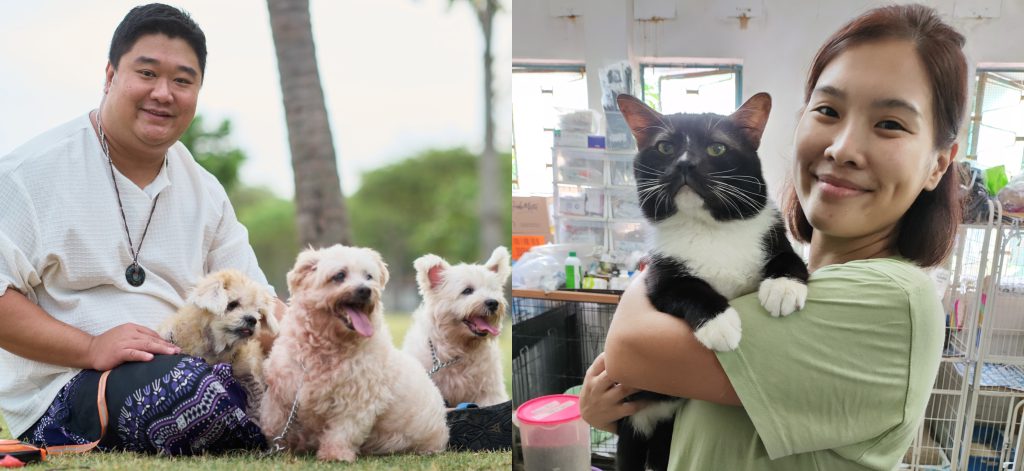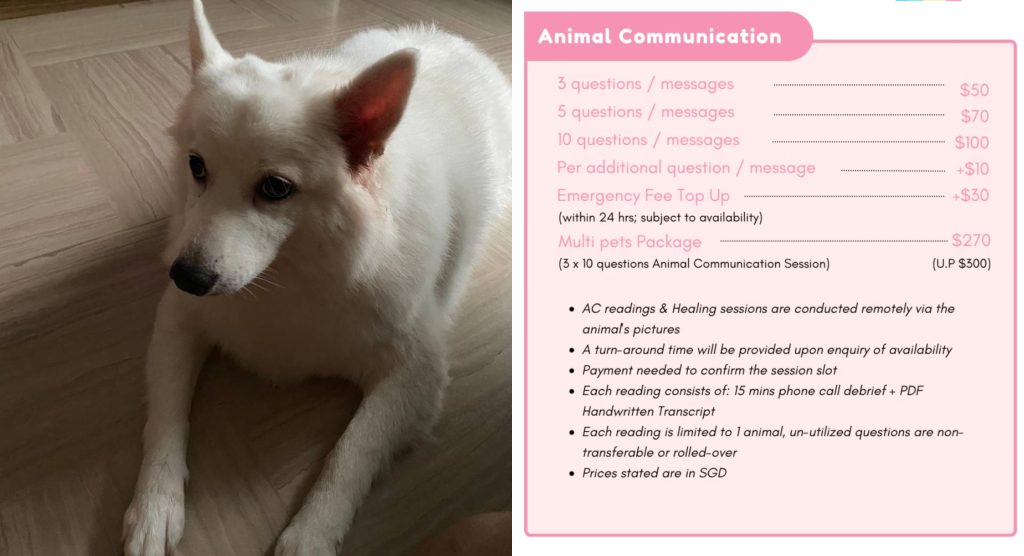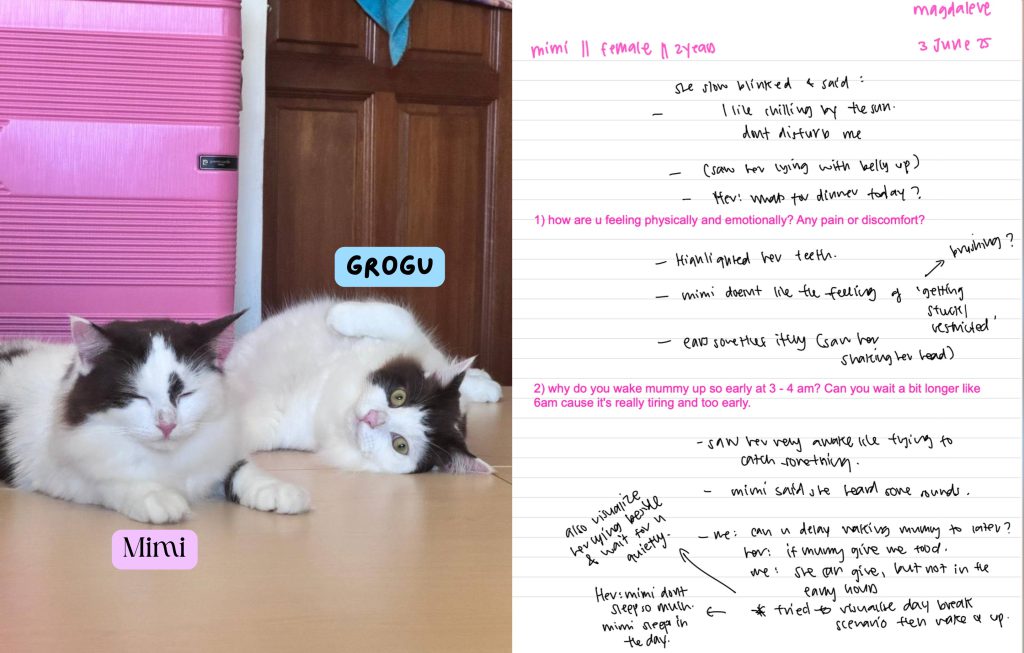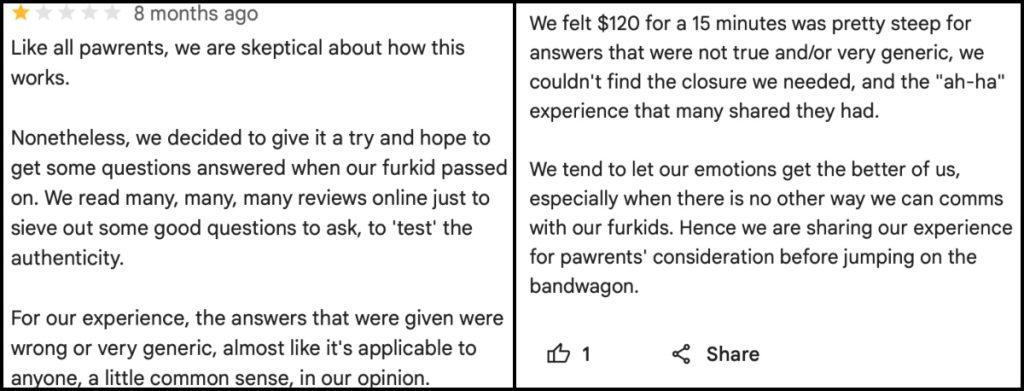As a pet owner, I often thought it would be easier if I knew what my dog was thinking, but I always dismissed it as something that only fantasy characters can do. That was, until I came across an article by The Straits Times on animal communicators (ACs) in Singapore at the start of the year.
Singapore’s pet population has been steadily rising in recent years, especially since the COVID-19 pandemic, and with it, so has the demand for pet-related services, including ACs, who claim to connect with animals through energy, intuition, or even telepathy.
People turn to them for a variety of reasons: to better understand the causes behind their pets’ unusual behaviours or emotional shifts, to reconnect with lost or missing pets, or to find a sense of closure after the death of a beloved companion.
While sessions can cost hundreds of dollars, many pet owners have said they provide comfort, clarity, and even emotional healing during difficult times.
But are these animal communicators truly capable of what they claim?
A “messenger” for pets
Two ACs I’ve spoken to, Ezekiel Ong and May Lim, described their job as similar to that of a “messenger”—someone who conveys messages that pets wish to pass on to their owners. Their work helps owners gain deeper insight into their pets’ thoughts and emotions.

But how exactly does this process work, given that humans and animals do not share a common language?
Ezekiel, the founder of Animal Communications Singapore, explained that the human mind functions at higher frequencies than animals, and in order to connect on the same level, communicators must learn to calm their minds through mindfulness and meditation.
“Communicating with animals isn’t quite the same as how we communicate with humans, for example, through verbal cues and body language,” added May, the founder of Pets Actually Can Talk (PACT).
“We communicate and connect to them telepathically—it can be through images or visions or sounds, feelings, thoughts, smells and scents, and from there we decipher and decode what the animal is saying.”
This approach, they shared, also applies to pets who have passed on. Owners typically send a photo of their pets, whether living or deceased, with both eyes looking directly at the camera, which communicators then use to focus and “match frequencies.”
But not all ACs are born with the “gift” to communicate with animals. Both Ezekiel and May went through courses to earn a certification in animal communication.
In particular, Ezekiel was taught and mentored by Rosina Maria Arquati, a Hong Kong-based AC whom he claims to be one of the more well-known animal communicators in Asia. Still, he hadn’t initially intended to pursue animal communication professionally as he was working as a pet groomer at the time.
That changed when he began to hear what he described as the voices of his canine clients. This experience soon led some pet owners to approach him for help in communicating with their pets. “So through all these small talks, I realised that pet owners are actually benefiting from this,” he added.
With his mentor’s blessing, Ezekiel began pursuing animal communication full-time in 2013 and has since established academies across Singapore and Thailand, teaching multiple students and providing reading sessions for over a decade.
May, on the other hand, started her career in animal communication much later than Ezekiel. She signed up for a course in 2016 after the passing of her family dog and began honing her skills by offering free sessions within her circle and at animal shelters.
Since then, she has communicated with a wide range of animals—from cats, dogs, and birds to even goats and horses. In 2021, she made the leap to pursue it full-time, leaving her job as a marketing executive to launch PACT.
A hefty investment some are willing to make
Based on online reviews on their Google and Facebook pages, both Ezekiel and May have served hundreds of customers, and it seems like the majority of them were satisfied with their sessions, including some whom I have interviewed.
One such client is Magdalene Teo-Yong, a partner at a local law firm, who was struggling to rehome her Japanese Spitz, Troy, from her in-laws’ care in February 2024. At her “wits’ end,” she turned to May, whom she was introduced to by a close friend.

Her session with May was conducted virtually, as is typical of May’s practice. Magdalene likened her experience to a vet visit, sharing that she had a brief discussion with May about her challenges, after which May crafted a list of questions for the communication with Troy. The session cost S$100 for 10 questions to be asked.
Following the virtual communication, May provided a 15-minute phone debrief along with a written transcript of the session. While Magdalene declined to share the transcript for privacy reasons, she said the content was enough to convince her that May had truly connected with Troy.
“I will say that the session with Troy was 90% accurate,” she shared, adding that May mentioned details only she or her family would have known. “On my side, I was somewhat relieved that Troy understood what was happening to him and the family at that time.”
Since then, she has returned to May for another session—this time for her two kittens, one of whom had been meowing persistently and waking her up at night. Magdalene has shared a transcript from that session, which can be seen below, and stated that she would approach May again if the need arises.

Like Magdalene, Simbian Chua, the founder of Century Bakkwa, shared a positive experience with animal communication.
She approached Ezekiel for a session for her pet dog, Prada, who had passed away suddenly last week. In a video posted on Animal Communications Singapore’s Facebook page, Simbian was seen in tears as Ezekiel read Prada’s message for her and her family over the phone.
She stated that it was the “best money ever spent” as it allowed her to speak to her pet. While the exact cost of Simbian’s session wasn’t specified, Ezekiel typically charges S$120 for a 15-minute express reading and S$240 for a 30-minute full session.
It’s a significant investment, but for some pet owners, it’s one they’re more than willing to make.
“Not fortune-telling”
Amid the sea of five-star ratings for both animal communicators, though, a lone one-star review on Animal Communications Singapore’s Google page offered a contrasting perspective.

The reviewer claimed that the answers they received were “either wrong or generic” and left them without the sense of closure that many others had experienced.
In response, Animal Communications Singapore explained that the nature of the animal communication process might not meet every expectation, though the business did not discredit the customer’s experience in any way.
This brings up questions about the accuracy of such readings. Ezekiel acknowledged that results can vary from session to session, and that some of his clients, while open-minded, remain sceptical and often ask verifying questions to which they already know the answers.
Of course there will be bad days where I may just get everything wrong, and I’ll never say that I’m a 100% accurate animal communicator because there’s no such thing as a 100% accuracy.
Ezekiel Ong, founder of Animal Communications Singapore
May also emphasised that the precision of each reading depends on how the individual resonates with the messages and interprets the animal’s responses. “Animal communication is communication, not fortune-telling,” she said.
Given this, it’s wise to approach these sessions with a healthy dose of scepticism.
Experts have also urged caution, with the Singapore Veterinary Association releasing a position statement discouraging engaging ACs for diagnosing and treating sick animals in 2022. This follows feedback from members about communicators interfering with medical treatment, at times causing delays.
And unlike veterinarians, animal trainers, and groomers, the bar is also admittedly low for one to become an animal communicator. There’s no requirement for licenses and professional training to practice, and no formal regulations oversee the industry in Singapore, leading to some bad apples in the industry.
Ezekiel noted that some self-proclaimed ACs would charge as much as S$30 to S$40 for a single question, and may lack mentorship from established practitioners. He stressed that communicators are not medical practitioners and need to be accountable and responsible before offering services.
-//-
Although I’ve felt that both May and Ezekiel have a lot of heart in what they do through my conversations with them, I still remain cautious and sceptical about the accuracy of animal communication.
But perhaps that’s because I have yet to experience a session myself.
After all, seeing is believing, and I might enlist their help someday for my pet in the future.
- Read other articles we’ve written on Singaporean businesses here.
Featured Image Credit: Ezekiel Ong/May Lim










